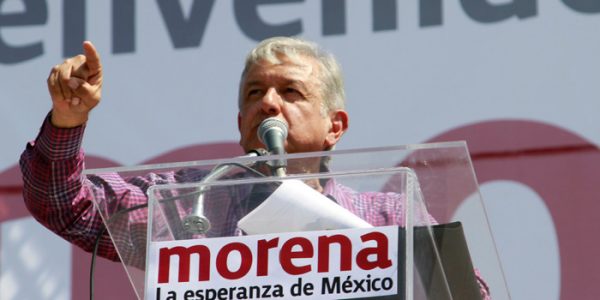Andrés Manuel López Obrador has been a candidate for the presidency of Mexico in the last two electoral processes, and next year, he intends to run for the third time.
In the mind of millions of Mexicans, this politician is simply a demagogue, and his populist rhetoric does not imply any real and effective proposal. Many people consider his speech to be totally empty, meaningless, to the point of incoherence.
At the beginning of his political career, López Obrador belonged to the PRI, then became the strong man of the left-wing party PRD for many years, and recently formed his own political party called Movimiento de Regeneración Nacional: MORENA (National Regeneration Movement), which has already begun to harvest political triumphs across Mexico.

Andres Manuel Lopez Obrador is no longer leading the polls in his third bid for president of Mexico. (PHOTO: neostuff.net)
According to some polls, Lopez Obrador could become the next president of Mexico in 2018, however, most recent ones placed him second to potential PAN candidate Margarita Zavala.
In his lastest campaign presentations, López Obrador has cited and idolized the late Cuban dictator Fidel Castro, stating that Castro has been one of the greatest leaders in modern history, who according to him, “knew how to lead the people of Cuba to a great economic and social situation”, which in the opinion of many, is totally false.
A huge sector of Mexican society is deeply concerned by the popularity of this politician, and fears that, if reaching the presidency, AMLO could lead Mexico to the same situation the Republic of Venezuela is currently going through.
According to UNOTV news website, there is clear evidence of the friendship between Andrés Manuel López Obrador and the president of Venezuela, Nicolás Maduro, even when AMLO denies it.
And the similarity of their ideologies is concerning, because in Mexico rights such as freedom of expression can still be defended, but AMLO could change that in case of winning the 2018 election.
According to El Horizonte newspaper, during 2006, López Obrador received from the then Venezuelan President Hugo Chávez approximately $200 million pesos annually for the promotion of radical groups in the Mexico City delegations of Iztacalco and Iztapalapa, bastions of the PRD and now of MORENA.
It was well known in Venezuela that Chavez had a “Bolivarian Revolution” center of operations using economic resources provided in those years by the National Assembly of Venezuela to promote the so-called “revolution” in other Latin American countries.
By Alejandro Azcárate for TYT
Disclaimer: Opinions expressed hereby are those of the author and not necessarily those of The Yucatan Times.



